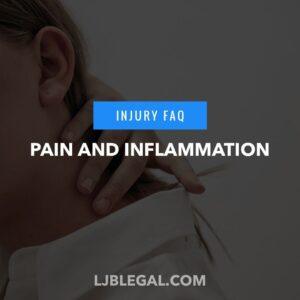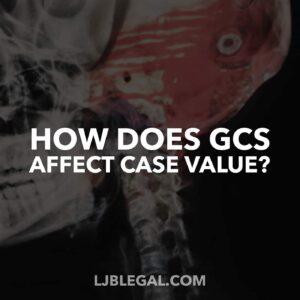
If you’ve been in a car accident, you may notice pain setting in soon after the crash, or maybe even hours or days later. That pain is often tied to inflammation. Inflammation is your body’s way of trying to heal, but it can also be what causes the pain you feel.
Understanding how inflammation works can help you get the right treatment sooner, and avoid long‐term problems. A knowledgeable Louisiana car accident lawyer can help you connect delayed pain to your crash and make sure your injuries are taken seriously by insurance companies.

How Does Inflammation Cause Pain After a Car Accident?
When your body feels injury, say from the impact of a car crash, your immune system kicks in. It sends out a complex set of signals designed to protect and heal. But those same signals often lead to pain. Here are the key ways inflammation causes pain:
What Is Chemical Signaling and How Does It Trigger Pain?
- When tissues are damaged, immune cells release inflammatory chemicals like prostaglandins. These chemicals make pain receptors (nociceptors) in nerves more sensitive. That means things that normally wouldn’t hurt can hurt.
- These chemicals send messages through nerves to your brain saying, “There’s damage—pay attention.” Those messages are what you perceive as pain.
How Does Swelling Create Pain After an Injury?
- Swelling (also called edema) happens when blood, fluid, and immune cells rush to the injured area to begin repair.
- As swelling builds, it pushes on nearby tissues and nerves. That pressure adds another layer to your pain—sometimes sharp, sometimes aching.
How Do Nerves and Glial Cells Make Pain Worse?
- Nerves don’t act alone. Immune support cells, especially glial cells, become active during inflammation. They release more chemicals—cytokines, chemokines, and other mediators—that increase the sensitivity of pain‐sensing neurons.
- This means the injured area can overreact to stimuli, even light pressure or movement. This is part of why pain may feel worse in some positions.


We GET IT DONE
Clients trust us to handle their case properly and effectively
FREE Confidential Case Review (985) 240-9773What’s the Difference Between Acute and Chronic Inflammation?
Not all inflammation is bad. It depends on how long it lasts and whether it is controlled.
What Is Acute Inflammation?
- This is the short‐term inflammation your body starts soon after injury. It causes the classic signs: red, warm, swollen, painful. That’s your immune system doing its job.
- In a car accident, acute inflammation helps repair soft tissues, ligaments, muscles, tendons, even small tears. It can help stop bleeding and begin tissue repair.
- Once healing is underway, acute inflammation should taper off.
What Happens When Inflammation Becomes Chronic?
- If inflammation doesn’t go away—if it lingers—it becomes chronic. That’s when it stops helping and starts hurting. Persistent inflammation can keep pain going, even after the original injury should have healed.
- Chronic inflammation can also lead to secondary damage: stiff joints, degraded tissues, nerve damage, or long‐term nerve sensitization.


We DO THE RIGHT THING
The correct choice – always – is to do the right thing.
FREE Confidential Case Review (985) 240-9773Why Does Inflammation Happen After a Car Accident?
To see how this applies after a car crash, consider what often happens in your body:
- You may have existing wear‐and‐tear in your spine—degenerative discs, dehydrated tissues—that by themselves do not cause pain. Many people have these changes without ever knowing.
- A sudden trauma—whiplash, hyperflexion, hyperextension—causes micro‐tears in ligaments, tendons, or soft tissues. Even if the disc or tissue was already degenerating, the trauma can stir up an inflammatory response. That’s when pain shows up.
- Inflammatory chemicals are released. Swelling develops. Pressure on nerves increases. Glial cells may activate and release more pain‐sensitizing mediators. All these together produce both sharp pain and dull aches.


We ARE TRANSPARENT
We don’t play games and we don’t hide the ball.
FREE Confidential Case Review (985) 240-9773Why Can Pain from Inflammation Be Delayed?
You might not feel all the pain right away. The pain could be delayed. Here’s why:
- Your body may release stress hormones right after the crash, masking pain temporarily.
- Micro‐tears or small injuries might not hurt until swelling builds and inflammation intensifies. That can take a few hours or days.
- If a disc is bulging or degenerating but not yet compressing a nerve, you might not feel pain until inflammation or swelling makes the disc press on a nerve.


We ARE COMPASSIONATE
Emotionally intelligent listeners with positive attitudes.
FREE Confidential Case Review (985) 240-9773How Can You Reduce Inflammation and Manage Pain?
You don’t have to accept persistent pain. Managing inflammation early can help both acute pain and prevent chronic pain. Here are proven ways to do that.
What Lifestyle Changes Help Fight Inflammation?
- Eating an anti‐inflammatory diet: more fruits, vegetables, whole grains, omega‐3 fatty acids (fish, nuts), less processed foods. These foods help reduce inflammatory chemicals in your body.
- Gentle movement: keeping motion helps circulation, reduces stiffness, helps reduce swelling. Physical therapy or guided stretching can be especially helpful.
How Does Managing Stress Help With Inflammation?
- Stress has real biological effects. It can increase inflammatory chemicals and make your pain worse. Techniques like mindfulness, controlled breathing, guided meditation can help.
- Good sleep matters. Poor rest increases inflammation.
What Role Does Medication Play in Reducing Pain?
- Over‐the‐counter anti‐inflammatory drugs (NSAIDs) can block chemicals like prostaglandins and reduce swelling and pain. Use them under medical guidance.
- For more serious or persistent pain, doctors may use prescription anti‐inflammatory medications, steroid injections, or other treatments to reduce inflammation.
- Physical therapy, sometimes chiropractic or other manual therapies, may help realign tissues, reduce swelling, and reduce pressure.
Why Does the Lawyer You Choose Matter in Injury Cases?
After an accident, insurance companies want to minimize how much they pay for pain and injury. If the inflammation and pain are not properly documented with medical visits, imaging, and follow‑ups, they may downplay or deny claims. Having a lawyer who understands how inflammation works in your body can help you get full compensation for your pain, medical bills, and future damages. LJBLegal has experience with cases where chronic inflammation causes ongoing pain—and with resources to show how much that pain really matters.
Key Takeaways: Pain, Inflammation, and Your Accident
- Pain often comes after inflammation. Inflammation is a natural response, but it also sensitizes nerves and creates pressure that causes pain.
- In a car accident, even preexisting tissue damage (like degenerative discs) may not hurt until inflammation kicks in.
- Acute inflammation helps healing; chronic inflammation keeps pain alive and creates deeper problems.
- Early recognition, good medical care, lifestyle changes, and legal documentation all help protect your health and your rights.
If you were injured in a car accident and you’re still hurting, schedule a medical examination. And don’t try to handle everything alone. Having the right legal team can help you recover as fully as possible, financially and physically. Call LJBLegal today at 985-240-9773
| Related Links: |















